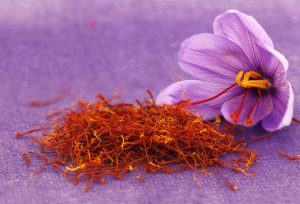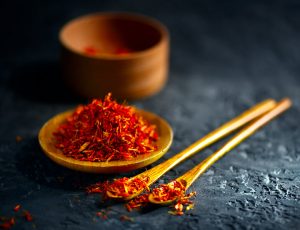Table of Contents
Saffron is the dried stigma of the Crocus sativus plant native to the Middle East. And is the world’s most expensive culinary spice largely due to the way it must be grown and harvested (by hand).
As a nootropic, Saffron has been used for thousands of years as an anxiolytic, sedative, and antidepressant.[i]
Today, Saffron supplementation is used to help manage appetite, for energy and stamina, anxiety, and is a very effective natural antidepressant medication.
Recent studies show Saffron as effective as some popular prescription antidepressants. And can even help alleviate the sexual dysfunction caused by these drugs.
I first became aware of the dietary supplement Saffron when researching this ingredient included in Performance Lab Vision.
And then noticed in the last year that it was appearing on shelves as a standalone supplement in the ‘brain health’ section of local vitamin and health food shops.
Here we’ll explore how Saffron benefits your brain.
Saffron helps:
- Anxiety & depression: The main active Saffron constituent crocin & safranal inhibits the uptake of dopamine and norepinephrine in the brain which helps improve mood.
- Alzheimer’s & dementia: Saffron inhibits the deposit of amyloid-β which is associated with the progression of Alzheimer’s disease. Saffron also inhibits the breakdown of acetylcholine (acetylcholinesterase) just like the current medication (donepezil) approved to treat Alzheimer’s.
- Neuroprotectant: Crocin and safranal which are unique carotenoids in Saffron make it a potent antioxidant. Scavenging free radicals which reduces inflammation, preventing apoptosis, and protecting brain cells and mitochondria.[ii]
Overview
Saffron (Crocus sativus) as a nootropic is the dried crimson stigma of the C. sativus flower cultivated primarily in Iran.
 The earliest reference to Saffron goes back to around 2,300 BC from Sargon, founder of the Akkadian empire. Sargon was born in a village on the shores of the Euphrates called Azupiranu (city of Saffron).[iii]
The earliest reference to Saffron goes back to around 2,300 BC from Sargon, founder of the Akkadian empire. Sargon was born in a village on the shores of the Euphrates called Azupiranu (city of Saffron).[iii]
Since then, documentation of Saffron use over the last 4,000 years for at least 90 illnesses has been uncovered.
Saffron takes a long time to germinate from seed and 3 years for the plant to flower. Once it blooms in mid-Autumn, the flowers must be picked carefully by hand within 1 – 2 weeks.
Each Crocus sativus plant produces 3 – 4 flowers per season. Each flower produces a 3-pronged style, each prong terminating in a vivid crimson stigma. Saffron is the dried stigma of Crocus sativus.
This labor-intensive production method makes Saffron the most expensive culinary spice in the world.
Saffron contains the metabolites crocin, picrocrocin, safranal, and the antioxidants lycopene and zeaxanthin as well as Vitamin B12 all which provide its medicinal value.[iv]
As a nootropic, Saffron may be used for major depressive disorder, PMS symptoms, post-partum depression, memory, appetite suppression, and preventing neurodegenerative diseases like Parkinson’s and Alzheimer’s.

How does Saffron work in the brain?
Saffron boosts brain health and function in several ways. But two in particular stand out.
- Saffron boosts mood. Recent studies suggest that brain-derived neurotrophic factor (BDNF), Nerve Growth Factor, and cAMP Response Binding Protein (CREB) all play a role in anxiety and depression.
Further research shows that Saffron has a significant effect on BDNF, NFG and cAMP levels in the brain.[v] Which likely explains why Saffron is so effective in treating teenage anxiety and depression.
One study in 2018 had 80 participants aged 12 – 16 years with anxiety and depression try Saffron extract (Affron®) 14 mg or a placebo for 8 weeks.
The study concluded that Saffron extract was effective in relieving the symptoms of separation anxiety, social phobia and depression compared to placebo.[vi]
Researchers in the psychology department at Murdoch University in Perth conducted a systematic analysis of every clinical trial they could find for high-quality, randomized, double-blind studies using Saffron, a placebo and antidepressant meds as controls in humans (not animals).
The team concluded that clinical trials support the use of Saffron for the treatment of mild to moderate depression.[vii]
- Saffron for preventing Alzheimer’s. One of the most common symptoms in Alzheimer’s patients is depression.
And doctors commonly prescribe antidepressants for treatment. Including drugs like sertraline (Zoloft®).[viii] Despite the fact that these meds don’t work for Alzheimer’s disease and come with a host of side effects.[ix]
An alternative treatment is obviously needed. So researchers set up a double-blind, placebo-controlled trial with 46 Alzheimer’s patients. The patients were given 15 mg of Saffron twice daily or placebo for 16 weeks.
The results of this trial showed Saffron produced a significantly better reduction in behavioral and psychological symptoms than placebo. And concluded, “Saffron is both safe and effective in mild to moderate Alzheimer’s”.[x]
The acetylcholinesterase inhibitor donepezil (Aricept®) is also prescribed to Alzheimer’s patients. For increasing acetylcholine which has been found to be low in these patients.
A 22-week, randomized, double-blind trial with 54 Alzheimer’s patients was conducted to compare donepezil with Saffron. Patients received either 15 mg of Saffron twice per day or 5 mg of donepezil twice per day for the extent of the trial.
This phase II study found Saffron extract was as effective as donepezil in the treatment of mild to moderate Alzheimer’s. But Saffron did not produce the side effect of vomiting.[xi]
How things go bad
Depression is a growing health problem. With over 10% of Americans taking prescription antidepressants. Of whom 90% experience at least one adverse effect. Ranging from sexual dysfunction to convulsion to bleeding disorders.
Antidepressant use can result in:
↓ Abnormal bleeding
↓ Agitation, aggression, anxiety, and delirium
↓ Confusion, convulsions and even death
↓ Decreasing memory, delusional thinking
↓ Hallucinations, headaches, and heart attacks
↓ Insomnia, lethargy, nightmares, and panic attacks
↓ Sedation, impaired driving, slow speech
↓ Sexual dysfunction, priapism
↓ Panic attacks, paranoia, suicidal thoughts, violent behavior
↓ Serotonin Syndrome, withdrawal symptoms
A growing database of studies and user reviews show that Saffron helps treat depression without the risky side effects of prescription antidepressants.
Saffron has also been shown to be effective with other conditions for which antidepressants are prescribed. Including anxiety, Alzheimer’s, and obsessive-compulsive disorder (OCD).
We even have reports of Saffron reversing the sexual dysfunction caused by using prescription antidepressants.

Saffron benefits
To experience Saffron’s nootropic value you’ll need to use more than a sprinkling of the spice from your local supermarket.
Studies show Saffron could be an alternative to some popular antidepressant meds.[xii] And for anxiety.[xiii]
Another study with 18 – 45-year-old women suffering from post-partum depression showed Saffron effective in reducing depression.[xiv]
And a group of women aged 18 – 45 dealing with Premenstrual Syndrome (PMS) found that Saffron was effective in relieving depression during two menstrual cycles (cycles 3 and 4).[xv]
Saffron is a smooth muscle relaxant and helps lower blood pressure. Likely because of its inhibitory effect on histamine H1 receptors, stimulatory effect on ß2-adrenoceptors, and antagonist effect on muscarinic receptors.[xvi]
Saffron inhibits acetylcholinesterase which increases acetylcholine in your brain. Improving brain signaling and helping learning and memory.[xvii]
Saffron inhibits the deposition of amyloid β-peptide (Aβ) fibrils which has been implicated in Alzheimer’s.[xviii]
Several human studies show Saffron as effective as some popular antidepressants in treating mild to moderate anxiety and depression.[xix]
Some of the symptoms of Parkinson’s Disease originate from under-utilization of dopamine in the substantia nigra area of the brain. Studies show Saffron helps protect the substantia nigra dopamine neurons associated with Parkinson’s.[xx]
Newly published studies show Saffron helps protect your eyes from ultraviolet blue light radiation (UV-B). And flicker sensitivity from glaring monitors and headlights.[xxi]
Saffron improves the oxygen and nutrient supply required for healthy eyes. By boosting blood flow in the retina and choroid of your eyes.[xxii]
How does Saffron feel?
 Many neurohackers report supplementing with Saffron has helped them stop eating junk food, avoid nighttime snacking, and they’re no longer obsessed with thinking about food all the time.
Many neurohackers report supplementing with Saffron has helped them stop eating junk food, avoid nighttime snacking, and they’re no longer obsessed with thinking about food all the time.
Saffron has been proven to help with Age-Related Macular Degeneration (AMD). Vision may be sharper. And you can see a line or two further down the Snellen chart at your next eye appointment.
Glare from headlights during nighttime driving and flicker from monitors is no longer a problem.
You may experience an improvement in mood when supplementing with Saffron. No longer over-reacting, and work-related stress now feels like you are again in control.
Many neurohackers report an increase in energy and better libido with Saffron.
Feeling tired and emotional is a thing of the past. You’re back to your bright, positive, happy self!
Saffron Randomized Clinical Trials and Research
Many studies have been conducted from a placebo controlled clinical trial, pilot clinical trial and randomized controlled trials examining saffron as a nootropic. Clinical research into the efficacy of Saffron is encouraging. But trial lengths have typically been limited to 4 – 6 weeks. And sample sizes are relatively small (30 – 40 people).
And keep in mind of the potential for bias because most clinical trials with humans have been conducted in Iran. Which produces nearly 90% of saffron for the world market. But these are still high-quality studies.
Saffron as good as Prozac
A double-blind, randomized trial with 40 adult outpatients suffering from major depression was conducted at the University of Tehran. The study compared Saffron petals with fluoxetine (Prozac®) for the treatment of depression.
Patients were given 15 mg of Saffron petals in the morning and evening, or 10 mg fluoxetine morning and evening for 8 weeks.
The study concluded that Saffron petals were as effective as fluoxetine in the treatment of mild to moderate depression. The remission rate was 25% in both groups with no significant differences in side effects.[xxiii]
Saffron for Alzheimer’s Disease
There is increasing evidence to suggest that Saffron could be used in the management of Alzheimer’s Disease.
In one Iranian study, 54 adults aged 55 year or older with Alzheimer’s participated in a 22-week, double-blind trial. Patients were randomly assigned 30 mg per day of Saffron (15 mg twice per day) or 10 mg per day of donepezil (Aricept®) (5 mg twice per day).
The study found that Saffron was as effective as the drug donepezil in the treatment of mild to moderate Alzheimer’s after 22 weeks.[xxiv]
Other research shows that Saffron may inhibit the aggregation of amyloid-β in the human brain and may therefore be useful in Alzheimer’s.[xxv]
46 patients with Alzheimer’s volunteered for a 16-week, double-blind trial. Patients were randomly assigned 15 mg of Saffron twice per day or a placebo for the 16-week study.
After 16 weeks, Saffron produced a significantly better outcome on cognitive function than placebo.
The study concluded, “This double-blind, placebo-controlled study suggests that at least in the short-term, Saffron is both safe and effective in mild to moderate Alzheimer’s.”[xxvi]
Saffron for ADHD
A randomized double-blind study was conducted with 54 children 6-17 years old who were diagnosed with ADHD.
The children received 20 – 30 mg methylphenidate or 20 – 30 mg Saffron per day for 6 weeks. Symptoms were assessed using the Teacher and Parent Attention-Deficit/Hyperactivity Disorder Rating Scale-IV (ADHD-RS-IV) at baseline and weeks 3 and 6.
The researchers found no significant difference in reduction of ADHD symptoms between the two groups. And concluded, “Short-term therapy with saffron capsule showed the same efficacy compared with methylphenidate.”[xxvii]
Saffron Recommended Dosage
 Recommended dose of Saffron is 25 – 30 mg twice per day for mild to moderate depression.
Recommended dose of Saffron is 25 – 30 mg twice per day for mild to moderate depression.
Clinical studies have evaluated doses ranging from 20 – 400 mg per day of Saffron.
Dosages up to 1.5 g per day of Saffron are thought to be safe.[xxviii] With toxic effects reported for 5 g doses.
As with many nootropics, more is NOT better when using Saffron. Some research shows that dosages above 1.5 g of Saffron can be extremely toxic.
Saffron Side Effects
Genuine Saffron is non-toxic and well-tolerated by most people when used at the recommended dosage.
Some reported side effects of Saffron include headaches, nausea, dizziness, vomiting, and mania (esp. if you are bipolar). Saffron can aggravate asthma symptoms.
5 g of Saffron are associated with toxic effects. And very high doses of Saffron (10 – 20 g) can be deadly.
No drug interactions have been reported. But interactions with anti-aggregating drugs are theoretically possible.
Do NOT use Saffron if you have a bleeding disorder.
Type of Saffron to buy
Saffron as a nootropic is typically sold in capsules.
Most individual Saffron supplements on the market are standardized (for 0.3% safranal) usually with 88.5 mg ‘Saffron extract’.
For nootropic use, look for supplements guaranteed to contain a patented version of Saffron extract. Otherwise, you’ll not likely experience the cognitive benefits of this nootropic for reasons I’ll go into in a minute.
NOTE: As an Amazon Associate I earn from qualifying purchases.
Affron®: Manufactured by PharmActive Biotech Products in Madrid, Spain and not easily found in Saffron products sold in the USA.
(Satiereal®: Made by PLT Health Solutions in Morristown, NJ and included in select Saffron products.
Safranal®: Manufactured by Sigma-Aldrich and included in some Saffron supplements.
Saffron is also included in much smaller amounts in some vison/eye formulas. While extremely effective for vision health, it’s not enough for much cognitive benefit.
For example, Performance Lab Vision contains 1 mg of Saffron extract. Which I’ve found very effective for reducing glare from computer screens and headlights during nighttime driving. And reducing eye fatigue from monitor flicker. But the dosage in this supplement is too low for any real cognitive benefit.
Keep in mind that Saffron is the most valuable medicinal food plant on the planet. Which makes it a primary target by unscrupulous marketers for adulteration.
Common adulterants include mixing Saffron with things like beet, pomegranate fibers, and red-dyed silk fibers to decrease the cost of Saffron.
Sometimes the flowers of other plants, including safflower, marigold, arnica and tinted grasses are fraudulently mixed with genuine Saffron stigmas.
The common mislabeling of turmeric (curcuma longa) as “Indian saffron”, “American saffron”, or “Mexican saffron” can easily be mistaken as genuine Saffron.
When Saffron is used for therapeutic purposes such as a nootropic supplement, adulteration will make it completely useless or even harmful.[xxix]
Before you buy your Saffron supplement make sure you check that it’s a reputable supplement manufacturer who tests all their raw ingredients and encapsulated product.
This is a classic case of discounted or cheap Saffron is not a bargain. But something else entirely. Buyer beware!
I highly recommend and use the best vision supplement I have every used containing Saffron: Click for Performance Lab® Vision
Nootropics Expert Recommendation
 Saffron 25 – 30 mg twice a day
Saffron 25 – 30 mg twice a day
I recommend using Saffron as a nootropic supplement.
Your body does not make Saffron on its own. So to get its benefits you must take it as a supplement.
Saffron is especially helpful for suffering from anxiety and depression. Studies show Saffron to be as effective as some popular antidepressants but without the side effects.
If you are currently using antidepressants, Saffron may help alleviate the sexual dysfunction caused by these drugs.
Saffron seems to be an effective way to control appetite. No snacking between meals and you’re no longer obsessed about food.
Saffron has the added benefit of more energy and stamina to help you through your day.
You can safely take up to 200 mg of Saffron daily if needed. But dosed 100 mg at a time. Be familiar with the associated side effects of higher doses of Saffron.
For nootropic use, choose a patented form of Saffron supplement such as the ones I’ve described above under “Type of Saffron to Buy”.
Saffron is also a very effective vision supplement. Driving at night is easier on your eyes. And the flicker caused by screens and monitors won’t leave you with eye fatigue later in the day.
I highly recommend and use the best vision supplement I have every used containing Saffron: Click for Performance Lab® Vision
For nootropic benefit look for genuine, verified pure Saffron or Saffron extract (standardized to 0.3 or 0.1% safranal).







Join The Discussion - 238 comments
Shari
May 23, 2021
I have noticed an increased almost manic effect. Not pleasant however. I talk more excessively and am unable to make decisions. The only difference in my life is I started taking saffron for mild depression. Could this be the reason? I felt better but now It feels “off”. Should I just reduce the amount? I only take 1 capsule a day. I am very sensitive to any medicines which is why I am trying a natural supplement.
David Tomen
May 24, 2021
Shari, the recommended dose of Saffron is 25 – 30 mg twice per day for mild to moderate depression. How much are using using?
shari
May 24, 2021
The supplement say one capsule contains 88.50 mg . But then it says 2 per day? Luckily I have only been taking 1 then But I stopped due to the before mentioned excitability. etc. I guess I can try a different supplement as it does seem to bring on the energy but the depression is still an undernote. I did have luck with St John’s Wort but the photosensitivity was intense so I stopped. Any suggestions? Thanks.
David Tomen
May 25, 2021
Shari, both Saffron and St. John’s wort affect dopamine and norepinephrine. So you can try other supplements that work in a similar manner. There are several but examples include Ginkgo Biloba and Ginseng.
Do a search using the function above the top menu and search for “norepinephrine”. Then look for natural nootropics that boost both dopamine and norepinephrine by scanning through each of the reviews that turn up in search.
Shari
May 24, 2021
88.50 mg per capsule is what my bottle says and it also recommends 2 per day? I guess I should try a different supplement at the 20mg. Before I give it up?
David Tomen
May 25, 2021
Try one capsule of your Saffron supplement. It is difficult to find a Saffron supplement that differs in dosage than the one you have.
kaila
December 5, 2020
I’ve started taking Saffron consistently for about a month (15mg Safranal, twice a day) and I do not feel any alleviation of symptoms (low mood). I also feel like it has increased my anxiety? I’ve used St John’s Wort before with lots of success.. Should I stick with Saffron a little longer? Or should I have felt the effects by now?
Thanks!
David Tomen
December 6, 2020
Kaila, if you’ve used Saffron consistently for a month with no benefit it’s likely the wrong supplement for you.
If St. John’s wort worked before why fix some that “ain’t broke”? Keep on using St. John’s wort and forget about Saffron.
Jman
November 13, 2020
Hello
Thanks for a great site. What is your thougs about Saffron and 5-htp together?
David Tomen
November 14, 2020
Jman, Saffron on its own is a powerful supplement for several reasons explained above. Don’t think adding 5-HTP to it would improve anything. But if you did stack them doses on both would be low (i.e. 30 mg + 25 mg).
Brenda
September 6, 2020
“The study concluded that Saffron petals were as effective as fluoxetine in the treatment of mild to moderate depression. The remission rate was 25% in both groups with no significant differences in side effects.”
I have a family member who’s tried to wean off of Prozac periodically for years, and brain-zaps are so severe that she ends up back on Prozac just to get relief from them.
So could discontinuing Saffron potentially produce this same side effect?
David Tomen
September 7, 2020
Brenda, great question and the answer is NO.
And that’s only one of the benefit of using natural supplements for treating depression instead of drugs like Prozac.
Brenda
September 7, 2020
David, thank you!
Jazmin
September 1, 2020
Hi David! It is save to take 50 mg of saffron with 500 mg of tryptophan per day? is there evidence of serotonin syndrome? Thanks a lot
David Tomen
September 1, 2020
Jazmin, no drug interactions with Saffron have been reported. Which applies to nootropics as well. Certainly nothing like Serotonin Syndrome because Saffron doesn’t work directly on serotonin.
Adjai
April 18, 2020
Hello David
Can saffron has effect on prolactin levels?
Thanks
David Tomen
April 20, 2020
Adjai, all the studies I’ve seen indicate it does not have a effect on prolactin levels.
Serge
April 12, 2020
Hello David
Can saffron help lower prolactin levels?
Thanks
David Tomen
April 23, 2020
Serge, not as far as I know. I’ve seen no evidence of this.
Jack
February 16, 2020
Hi David,
I’m currently taking Vit D, vit E, chlorella, magnesium, curcumin, DHA, B complex and SAM-e (400mg).
Could I add saffron to my stack, or do you see any bad interaction?
Thanks.
David Tomen
February 16, 2020
Jack, Saffron at the recommended dosage should be fine with the stack you mentioned in your comment. But see the “Side Effects” section of this review to verify.
Jack
February 16, 2020
Thanks David!